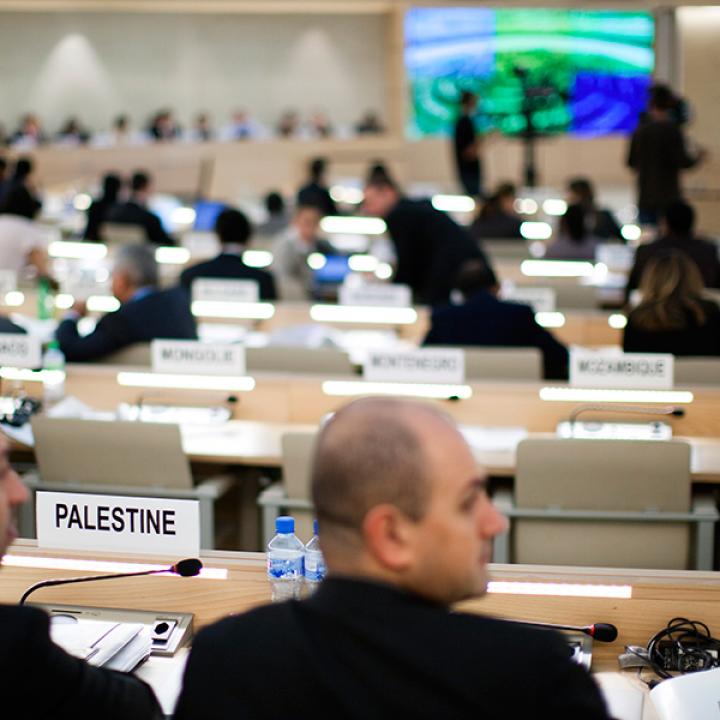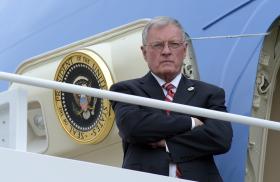
- Policy Analysis
- PolicyWatch 4106
Recognizing “Palestine”: Rationale, Expectations, Implications

An Israeli legal expert, a Palestinian political activist, and a French journalist explore the many shortcomings of recognition, including its failure to address Israeli fears and promote reform in the PA.
On September 18, The Washington Institute held a virtual Policy Forum with Tal Becker, Samer Sinijlawi, and Isabelle Lasserre to discuss moves by Western governments to recognize a Palestinian state. Tal Becker previously served as the legal advisor to Israel’s Foreign Ministry and is currently a vice president at the Shalom Hartman Institute in Jerusalem. Samer Sinijlawi is president of the Jerusalem Development Fund and a longtime activist in the Fatah movement. Isabelle Lasserre is the diplomatic correspondent for the French daily Le Figaro. The following is a rapporteur’s summary of their remarks and should not be ascribed to the cited speakers.
Tal Becker
Recent decisions by governments in the West to recognize Palestinian statehood should be viewed as a rebuke to Israel emanating from domestic politics within those countries, not a constructive effort to leverage a thoughtful process of recognition to advance meaningful change between Israelis and Palestinians. These decisions are performative and counterproductive, in the service of “looking good” rather than “doing good.”
It is only logical that Israelis across the political spectrum consider moves to recognize “Palestine” as a victory for Hamas, especially given that recognition does nothing to address the horrific situation of Israeli hostages still held by Hamas in Gaza. Some analysts try to argue that Hamas opposes Palestinian statehood but that we should listen to Hamas leaders themselves, who have gleefully welcomed announcements of recognition as a success facilitated by their October 7 attack. In fact, Hamas might oppose recognition if it were linked to a process of reconciliation and peace, but these announcements of statehood recognition are not conditioned on anything—not on the release of the hostages, not on Hamas disarmament, not on any process of mutual recognition.
Furthermore, the “New York Declaration” on a two-state solution endorsed last week by the United Nations General Assembly rests on promises made by the Palestinian Authority (PA) regarding reform, including a commitment to hold elections in the coming year. From Israel’s perspective, this seems backward, giving the concession on recognizing a Palestinian state today in exchange for something (elections) the PA leader promises to do in the future, a promise made and broken many times before. The reverse order, in which international recognition would be granted following the implementation of those measures, would more effectively disincentivize Hamas and incentivize the PA to honor its obligations on good governance. In theory, a declaration on recognition could have affirmed both Palestinian and Israeli peoplehood and their right to a state, which could have undermined both Hamas’s maximalist agenda and the thinking of those Israelis who want full annexation of Palestinian territories—but even that framing was not used.
Ultimately, only one constituency matters when it comes to recognizing Palestinian statehood—the Israeli people—and the challenge of convincing Israelis that such a state would not be a threat to their security is vastly greater today than it was before October 7. By failing to address the core fears of the Israeli people—especially by doing nothing to free the hostages or remove Hamas from power—these moves on recognizing Palestinian statehood by the international community only make this process more difficult. Ironically, the one constituency inside Israel that might welcome these declarations recognizing Palestinian statehood are annexationists, who will use it as political cover to advance their agenda.
Samer Sinijlawi
Declarations by European countries recognizing “Palestine” are much more about domestic politics than about Hamas or the ongoing war. The streets in Europe are boiling, and recognition of Palestinian statehood is an action leaders can take to appease voters without taking tougher, more difficult measures like sanctioning Israel. In fact, recognition will have little real impact on either the Israelis or Palestinians—after all, the only state from which Palestinians need recognition is Israel.
The key question remains: How do we convince Israelis that they have a real partner in Palestinians and that working together will lead us both to a secure and stable future? Especially since October 7, most Israelis oppose Palestinian statehood not out of ideology but out of fear, so Palestinians need to address Israel’s legitimate security concerns. International pressure will not move the Israeli people, nor will the political theater of recognizing a Palestinian state.
To build real peace, we need to create a process that engages Israelis and Palestinians, and for that we need to begin with a change of leadership. The decisions to recognize Palestine we are discussing are based on a letter from PA President Mahmoud Abbas to Saudi Crown Prince Muhammad bin Salman and French President Emmanuel Macron promising Palestinian presidential and legislative elections, in which Hamas would be forbidden to participate, within a year. It is absolutely essential that this election occur before the next Israeli election so that Israeli voters can see the possibility of a new, popular Palestinian leadership that can take the unpopular decisions necessary for peace. Once Israelis see that ordinary Palestinians have chosen a new leadership, we hope they will be encouraged to cast their own votes for a new coalition committed to peace and reconciliation.
President Abbas has convinced European leaders he is reforming the PA, but there has been no meaningful reform. To the contrary, he runs a police state in which peaceful activists are picked up for interrogation, never to be seen again. Instead, Abbas likes the process we will see in New York, where he enjoys coming each year to deliver an address before the leaders of the world. But this is not real leadership and this is not real reform.
Isabelle Lasserre
France has taken the lead in the international effort to recognize a Palestinian state for three reasons: (1) President Macron is frustrated with Prime Minister Netanyahu, who he believes is playing an escalatory role in the Gaza conflict; (2) Macron is moved by the humanitarian crisis in Gaza; and (3) Macron is using this issue to quiet criticism from France’s political left. According to the French foreign minister, Macron decided to recognize a Palestinian state on the day in June when Israel started its bombing of Iran. As for format, organizing international conferences is one of Macron’s favorite tools of foreign policy.
It is important to note that Macron is struggling domestically with both a political and an economic crisis and has responded, not unexpectedly, by redoubling his efforts to play a leadership role on the international scene. Beginning with the “yellow vest” movement of 2018–20, he has faced strikes and left-wing protests, which have been a major challenge to his administration. Recognizing a Palestinian state helps him outflank opposition on the left, which views this as a major issue. In the long run, however, it is unlikely that this strategy will be sufficient to recapture or neutralize the left, among whom antisemitism is rampant.
France views the success of the New York Declaration and the effort to broaden support for Palestinian statehood as a major diplomatic victory. Without any apparent evidence, Paris even believes that the United States will eventually support the French initiative on Palestinian statehood, given that the declaration envisages Arab states working toward normalization with Israel, a central tenet of President Trump’s foreign policy since the signing of the Abraham Accords in 2020. France also has great faith in PA President Abbas’s commitments to hold elections and accepts uncritically the claims that he has already begun a meaningful process of reform.
Macron describes his policy toward the Middle East as one of “equilibrium”—finding a balance in relations with Israelis and Palestinians to advance the goal of peace. However, with Israel viewing recognition of Palestinian statehood as benefiting Hamas at its expense, this approach runs the risk of having the opposite effect: provoking Israel to respond by annexing West Bank territory, which would ultimately set back the cause of Palestinian statehood.
This summary was prepared by Kate Chesnutt. The Policy Forum series is made possible through the generosity of the Florence and Robert Kaufman Family.





